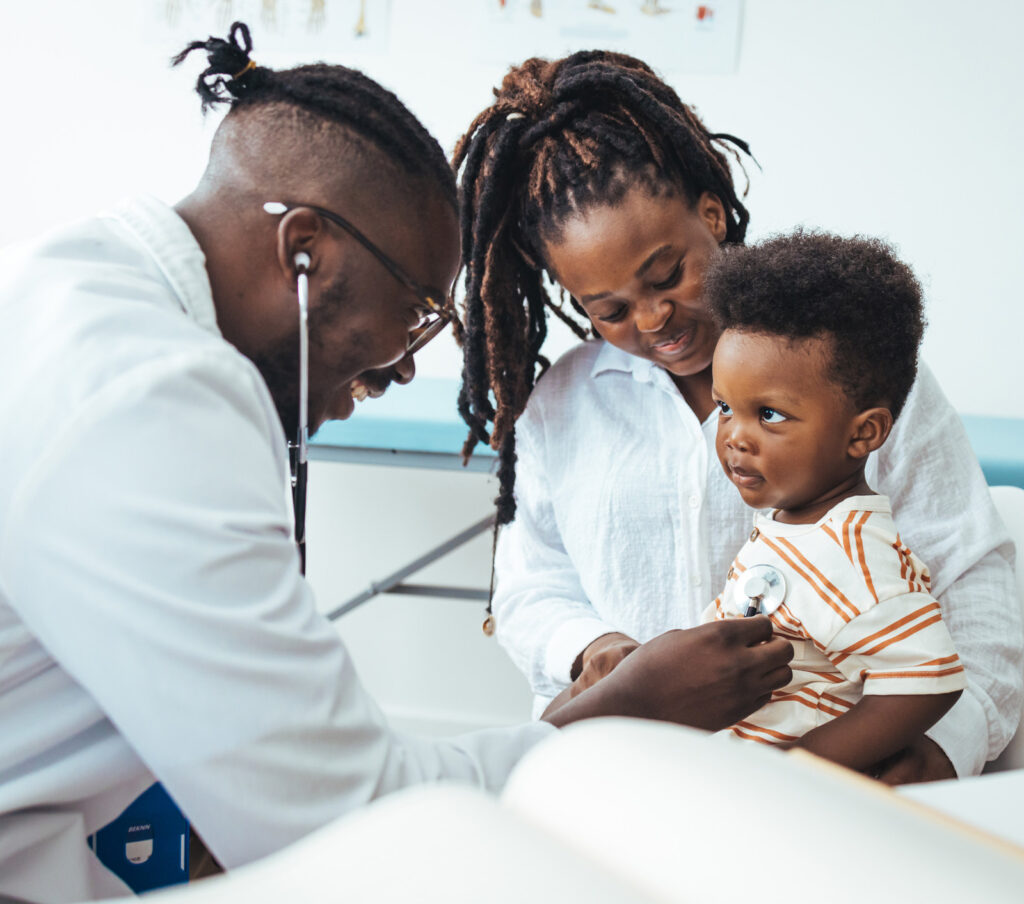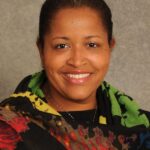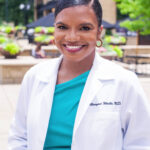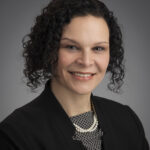There is no single solution to the racial and ethnic disparities that exist in health care today. But myriad efforts are being made. In this episode of the podcast, we’re focusing our conversation on one such effort: The New Century Scholars Resident Mentoring Program from the Academic Pediatric Association. The program aims to decrease racial/ethnic disparities by increasing diversity among pediatricians working in academic settings such as education, research and clinical care.
Here to talk about the program are three past New Century Scholars: 2023 program co-director Dr. Brandi Freeman, an academic pediatrician at the University of Colorado where she also serves as their Vice Chair for diversity, equity and inclusion; co-director Dr. Morgan Walls, a general academic pediatrician at Atrium Health Wake Forest in Charlotte, North Carolina, and Dr. Rachel Thornton, Vice President and Chief Health Equity Officer for Nemours Children’s Health. Learn more about the New Century Scholars Resident Mentoring Program.
Carol Vassar, host/producer
Guests:
Brandi Freeman, MD, MS, Associate Professor, Pediatrics-General Pediatrics, University of Colorado, and Co-Director, Academic Pediatric Association New Century Scholars 2023 Program
Morgan Walls, MD, Assistant Professor of Pediatrics, Division of General Academic Pediatrics, Atrium Health, and Co-Director, Academic Pediatric Association New Century Scholars 2023 Program
Rachel Thornton, MD, PhD, FAAP, Vice President, Chief Health Equity Officer, Nemours Children’s Health
Subscribe, review or let your voice be heard at NemoursWellBeyond.org.
Episode Transcript
Carol Vassar, podcast host/producer (00:00):
Welcome to Well Beyond Medicine, the Nemours Children’s Health Podcast. Each week, we’ll explore anything and everything related to the 80% of child health impacts that occur outside the doctor’s office. I’m your host, Carol Vassar, and now that you are here, let’s go.
(00:20):
MUSIC:
Let’s go! Well Beyond Medicine!
(00:27):
Racial and ethnic disparities in healthcare and their causes are significant issues with deep roots and steep costs to individuals, communities, and the economy. While not intractable, making strides in reducing racial and ethnic disparities requires recognition and awareness, causation analysis, policy change, and evidence-based programs across all levels of healthcare in the U.S. In other words, there is no single solution to the racial and ethnic disparities that exist in healthcare, but myriad efforts are being made. Today, we’re focusing our conversation on one such effort, the New Century Scholars Resident Mentoring Program from the Academic Pediatric Association.
(01:19):
The New Century Scholars Program aims to decrease racial and ethnic disparities by increasing the number of pediatricians working in academic settings such as education, research, and clinical care. Here to talk about the program are three past New Century Scholars 2023 Program, Co-Director, Dr. Brandi Freeman, an academic pediatrician at the University of Colorado, where she also serves as their vice chair for diversity, equity, and inclusion. Co-Director, Dr. Morgan Walls, a general academic pediatrician at Atrium Health Wake Forest in Charlotte, North Carolina, and Dr. Rachel Thornton, vice president and chief health equity officer for Nemours Children’s Health. Dr. Thornton was in the very first class of New Century Scholars in 2005, and she begins our conversation with some background on the program. Here’s Dr. Rachel Thornton.
Dr. Rachel Thornton, Nemours Children’s Health (02:21):
Well, I had the honor to be a member of the very first class of New Century Scholars when this program was initiated, and it really is a program that’s focused on pediatric residents from underrepresented backgrounds in medicine and in pediatrics who have a strong interest in academic pediatrics, and that’s across disciplines. I think what we also find is that many, many of the trainees also have an interest in health equity and health equity research and in medical education and in the pipelines within medical education and academic pediatrics, so it’s a robust program. It’s enjoyed co-sponsorship from the American Board of Pediatrics over the years and from the American Pediatric Society. So it is very well regarded within the academic pediatrics community and has been, as you will hear from Doctors Walls and Freeman, a tremendous source of support, mentorship, and encouragement, and information for the future of academic pediatrics and even for some of us who are not the future anymore, but excited to support the next generation.
Carol Vassar, podcast host/producer (03:32):
You’re the present, which is just as important. Let’s talk about the future of pediatrics and the future of the New Century Scholars Program. Dr. Walls, explain to me what it is, who you’re interested in recruiting into this program, and what the benefits are to people who are becoming these New Century Scholars.
Dr. Morgan Walls, Atrium Health Wake Forest (03:53):
Sure. So we are recruiting residents typically in their second year of pediatric residency into the program who self-identify as being underrepresented in medicine. We know that there is a crisis of workforce diversity within pediatrics and within medicine in general. So our goal is to identify those residents who see themselves having a future in academic medicine early on so that we can provide them with the mentorship that we feel like is so valuable. Mentorship has been integral in the success of my career.
(04:29):
I was of New Century Scholar as well some years ago, and it was really through this program and the APA that I was able to see what opportunities were available to me to get guidance on the journey. In academics, there are many challenges and barriers to success; however, mentorship is one of those things that can give you the key to having a successful career. So we like to pair our residents with junior and senior mentors, so folks that are at the assistant and early career faculty level, as well as those who are more along in their career at the associate or full professor level that they can get advice for early on going into fellowships and early career jobs, but also get more of that longitudinal view from the associate and full professors.
Carol Vassar, podcast host/producer (05:21):
So, Dr. Freeman, I’m a second-year resident. I might be interested in the program. Talk about what you would say to them. What are the benefits to them? The mentorship sounds like it is a key for this program. Talk about that.
Dr. Brandi Freeman, University of Colorado (05:37):
Yeah. So I’m also a former scholar as well and can definitely say that the mentorship is key. It’s that connection that you may not get, whether in your own residency program or even just wandering around this meeting. The New Century Scholars Program allows our scholars to connect with the current and future leaders of academic pediatrics on their way to becoming that themselves. So it gives them guidance during the meeting through our sessions, but also gives them a family of sorts. I talked to someone today who told me they saw the scholars going together to the speed mentoring event and where they have this community within that allows them to also feel really comfortable within this massive meeting that I think helps them continue in terms of this path of what is it to be part of this very, very large academic meeting.
Carol Vassar, podcast host/producer (06:29):
What are some of the barriers that residents and maybe second-year residents and beyond are finding in terms of getting past those and into a full career as a full-fledged pediatrician?
Dr. Brandi Freeman, University of Colorado (06:45):
Yeah. I think sometimes what we see is, unfortunately, bias shows up. So where people don’t necessarily always recognize the excellence in certain residents for certain reasons that we work through. I’m sure you probably already talked about on this podcast in terms of how biased racism can show up, but it’s giving them that sponsorship and connection that allows them to really see themselves in the place and have that sponsorship to get to that next level. I think the other thing that can be a barrier is knowing what the hidden curriculum is. I think our program, in some ways, allows insight into what are those different things that programs may be looking for, but not necessarily articulating like on a website.
Carol Vassar, podcast host/producer r (07:33):
Give me an example.
Dr. Brandi Freeman, University of Colorado (07:35):
So I think in terms of application preparation for fellowship, one of the things that a lot of programs look for is research, but what does that mean, and how do you articulate that? How do you communicate that to a program in terms of the different things that you’ve done? One of the things that we can do as a program is talk with our scholars about, “Okay, you did this research project. Let’s walk through how you’re going to explain not only what that meant to you but what that’s going to mean for your future career,” and so answering it in a way that helps a program see their potential and visualize them in the future of their career to help their acceptance in moving forward.
Carol Vassar, podcast host/producer (08:17):
How do you measure success? Dr. Walls, how do you see and measure the success of the New Century Scholars?
Dr. Morgan Walls, Atrium Health Wake Forest (08:25):
We look at our success based on the scholars really and what they tell us. So a lot of the program’s continuance has been scholars completing the program and saying, “Wow, that was a really meaningful experience to get me to where I wanted to be,” because all of the scholars might not be headed for the exact same goal or the exact same aim. Some want to go into cardiology fellowship, others want to come out and have a certain position in general pediatrics, and that might be in medical education or in research. So individualistically, success might look different. So we gauge our success by hearing feedback from the graduating scholars down the road and learning what they’re doing and how our program made an impact and a difference in them getting there, Dr. Thorton.
Dr. Rachel Thornton, Nemours Children’s Health (09:14):
If we look back at the long arc of the program, there actually was a paper published in Academic Medicine in 2015 by Lee Pachter and Cheryl Kodjo, the founding directors of the program really looking at the impact the program has. There have been a lot of efforts over the years and here I’m channeling my prior identity as a co-director of the program several years ago to make sure that we are tracking and engaging our alumna across their trajectories after they conclude their participation in the program. Whether that is really knowing what those successful, immediate next steps are for folks as they transition from residency into their post-graduate experiences as fellows in a variety of different disciplines or in that first faculty career, that first faculty position along their career trajectory, it really helps to see and to garner support across academic pediatrics, how broad the impact is.
(10:16):
When this program began, I think many people thought of it as really being focused on general academic pediatrics and perhaps some of those disciplines that were more closely aligned with the professional identity of people in the Academic Pediatric Association. The identity of the APA really has progressed to be focused on career development of all academic pediatricians across disciplines. But beyond that, we found that there’s something about the New Century Scholars community that for people, whether they’re going into hematology, oncology, pediatric intensive care and critical care medicine, emergency medicine, general pediatrics, cardiology, across the board, there’s something about this community and the tools and the pearls that people get from participating in this community that really equips them to have the support.
(11:09):
We all know, those of us who’ve been on the academic pediatrics trajectory, it’s not an easy road. It’s a road of passionate commitment and purpose. I think when Dr. Freeman talks about those unspoken truths of navigating the path, that can be everything from how do you learn the tools to engage effectively with mentors to get the most out of those mentoring relationships. How do you build the confidence to ask for sponsorship to declare, “This is what I want to be doing, and let me know when opportunities arise?” Then it also creates a peer mentorship network for folks that I don’t think we can overestimate how important it is having peers with whom we share lived experiences, interests, community to help us navigate and share their experiences.
(12:03):
I’m always struck when I read the applications, the depth of things that many of our trainees are managing beyond the rigors of being a pediatric resident. So it’s also an opportunity for us to ensure that we create a space where people can have community, a space that sometimes normalizes a set of experiences of financial responsibilities, of caregiving, and family responsibilities that may be different than people who are coming from, whether it’s more economic privilege or from a family of folks who understand healthcare trajectories and academic trajectories. So I think that there’s so many things that we have learned over the years about the value of New Century Scholars.
Carol Vassar, podcast host/producer (12:51):
I want to ask you personally, as a member of that first class, how has that community supported you through the trajectory of your career? I’m assuming they have.
Dr. Rachel Thornton, Nemours Children’s Health (13:02):
Oh, definitely, but I think what’s really interesting to me is being a part of the scholars’ class at the time feels like the most exciting thing. You’re going to get all you can out of this particular community, this experience during the course of those two years. In reality, I think that what happens is it really expands your network. This program would not be possible without the commitment of senior academicians and junior academicians from all backgrounds who see the value of investing in ensuring we have a workforce that really represents the diverse experiences and trajectories within academic pediatrics.
(13:45):
That’s the workforce we need to ask those challenging questions and to interrogate scientific questions across disciplines from many different perspectives. So when you become a scholar, you have the benefit of your own mentoring network. You have the benefit of your colleagues, but then you become part of this alumni community. Every year at PAS, we have the opportunity to engage again with one another, and it gives entree. Dr. Freeman hasn’t talked about all the things she’s done to try and make this meeting more accessible to trainees, but there’s so many ways that it’s the beginning of a journey and it’s the beginning of expanding a network that reaps professional dividends in ways you can’t imagine at the beginning.
Carol Vassar, podcast host/producer (14:25):
Well, let’s turn to Dr. Freeman and ask about that. How are you having the community writ large really access things here at PAS and come together here at PAS? Talk about that.
Dr. Brandi Freeman, University of Colorado (14:38):
So I think there are two ways that we were able to do that this year. So one, I think one of the sessions we did with our scholars was talking about giving that elevator speech and preparing them to be able to go out to be in the exhibit hall to meet all of the different institutions that were here and be able to present themselves in a way that they could really start working on that confidence of what they wanted to do. The other thing we did was a, I guess, branding in a way of where we wanted to make sure everyone could identify who our New Century Scholars were, so making sure we added a sticker to their badges so that you could not only know who our scholars were, everyone else who was supporting the program. So our mentors are wearing these stickers. Everyone is identified so you can see who NCS is and be able to be a part of, or even support, in the future our program.
Carol Vassar, podcast host/producer (15:27):
Have the three of you become mentors after having been mentored? Is that-
Dr. Brandi Freeman, University of Colorado (15:32):
Yes.
Carol Vassar, podcast host/producer (15:33):
Yeah. Dr. Walls, talk about your mentoring relationship now after having been mentored through this program.
Dr. Morgan Walls, Atrium Health Wake Forest (15:39):
So I haven’t for served as a formal mentor in the program. Now as the co-director of the program, I feel like a secondary mentor to all of the students and residents that are coming through and associated with the program. It’s been really valuable to take the information that I received at that stage and then pay it back. So we’ve talked a lot about in our NCS cohort this year, the value of reaching back and pulling somebody with you. So even for our residents, we have encouraged them, and many of them have already started to do this work where they are at their own institutions of reaching back to medical students and providing mentorship to them. So letting them know about the value of mentorship for their own career, but also teaching them a little bit of how to be an effective mentor to those that are coming behind them, ’cause even at this stage, they find theirselves in a lot of positions, whether it’s clinically or elsewhere of just being mentors to the younger population.
Carol Vassar, podcast host/producer (16:41):
Dr. Freeman, you served as an official mentor?
Dr. Brandi Freeman, University of Colorado (16:45):
I have. Ironically, I was Dr. Walls’ junior mentor.
Carol Vassar, podcast host/producer (16:49):
There you go.
Dr. Brandi Freeman, University of Colorado (16:49):
It goes full circle, and I’ve had the opportunity to work with a couple of other scholars. I think it’s been super rewarding. Whether they went into general academic pediatrics or I’ve had emergency medicine. There’s one scholar who’s a neonatologist down in Atlanta now, and it’s really, I feel like helped me feel like I’ve given back, but also really helped me to learn through their experiences.
Carol Vassar, podcast host/producer (17:13):
Dr. Walls, talk about the sponsors who are part of this, an important part of this program.
Dr. Morgan Walls, Atrium Health Wake Forest (17:19):
Yeah. Thank you so much for that opportunity. We definitely want to highlight the sponsors of the New Century Scholars Program. So that includes several organizations, including the Academic Pediatric Association, the American Board of Pediatrics, the American Pediatric Society, as well as subspecialty organizations, including the Society for Developmental and Behavioral Pediatrics and the American Society for Pediatric Nephrology. So we just wanted to make sure we acknowledge their support of the program.
Carol Vassar, podcast host/producer (17:50):
Dr. Thornton, I’m going to give you the last word, and I want you to talk a little bit about how your participation in the New Scholars program has really exemplified going well beyond medicine and tie it back into Nemours.
Dr. Rachel Thornton, Nemours Children’s Health (18:05):
Absolutely. Well, first of all, I would love for our residency programs, both in Florida and in Delaware really, to see this as another tool in the toolkit for our underrepresented in medicine residents, to think about this as a program that we can sponsor and encourage and recommend our own pediatric residents to take part in who have a passion for a career in academic pediatrics. Going well beyond medicine, for me, really is about reaching out into the community about having that durable impact, and we do that in so many different ways. I think one of the ways that we do that is when people cross the threshold to seek services from us in our clinical care delivery settings; we are ready to channel what we understand from ourselves, from our colleagues, from the broader community of academic physicians and clinicians across the board to be responsive to their needs.
(19:06):
One of the ways we create that responsiveness in healthcare delivery systems that sees who people are well beyond medicine, well beyond the walls of clinical care, is by bringing more people with diverse experiences and backgrounds into the care delivery process. That’s exactly what the New Century Scholars does, not just around the provision of clinical care, but also around the clinical investigation, the public health, and applied population health research that will allow us to improve the health of entire communities.
(19:40):
MUSIC:
Well Beyond Medicine!
Carol Vassar, podcast host/producer (19:44):
Thanks for listening to our conversation on the New Century Scholars Resident Mentoring Program with me, Carol Vassar, and our guests, Dr. Brandi Freeman, Dr. Morgan Walls, and Dr. Rachel Thornton. Learn more about the program by checking out the link in the show notes for this episode of the podcast. What’s being done successfully in your world to reduce racial and ethnic disparities in healthcare? In your estimation, what more needs to be done? Leave your voicemail at nemourswellbeyond.org. That’s nemourswellbeyond.org.
(20:19):
Maybe you’ll hear your voice on an upcoming episode of the Well Beyond Medicine Podcast. While you’re there, check out our other episodes, subscribe to the podcast, and leave a review. Thanks to Che Parker, Cheryl Munn, and Susan Masucci for this week’s production assistance. Join us next time as we explore Nemours’ leadership in bringing back to Florida’s panhandle a much needed healthcare service: pediatric cochlear implantation. Until then, remember, together, we can change children’s health for good well beyond medicine.
(20:59):
MUSIC:
Well Beyond Medicine!











